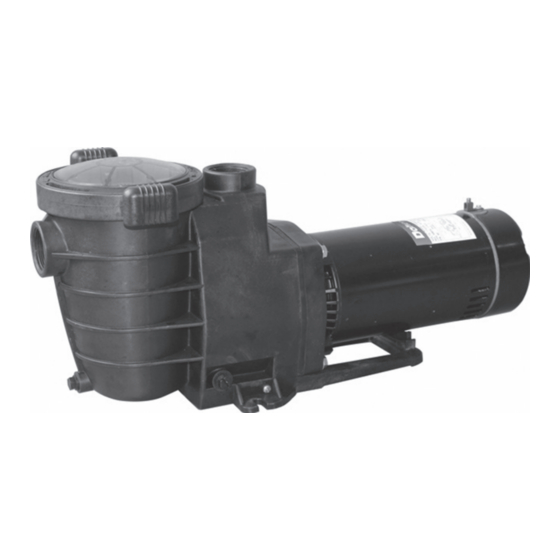Doheny's 7817 Installation, Betrieb und Teile - Seite 4
Blättern Sie online oder laden Sie pdf Installation, Betrieb und Teile für Schwimmbadpumpe Doheny's 7817 herunter. Doheny's 7817 8 Seiten. Silencer pumps

IMPORTANT: Place filter manual air relief valve
in the open position and wait for all pressure in
the system to be relieved.
Before starting the system, fully open the manual
air relief valve and place all system valves in the
'open' position to allow water to flow freely from the
tank and back to the tank. Stand clear of all
equipment and start the pump.
IMPORTANT: Do not close filter manual air relief
valve until all pressure has been discharged
from the valve and a steady stream of water
appears. Observe filter pressure gauge and be
sure it is not higher than the pre-service condition.
CHAPTER 2
: INSTALLATION LOCATION
General Installation Information
• All work must be performed by a qualified service
professional, and must conform to all national,
state, and local codes.
• Install to provide drainage of compartment for
electrical components.
• These instructions contain information for a variety
of pump models and therefore some instructions
may not apply to a specific model. All models are
intended for use with swimming pool applications.
The pump will function correctly only if it is properly
sized to the specific application and properly
installed.
▲WARNING: Pumps improperly sized or installed or
used in applications other than for which the pump
was intended can result in severe personal injury
or death. These risks may include but not be limited
to electric shock, fire, flooding, suction entrapment
or severe injury or property damage caused
by a structural failure of the pump or other system
component.
▲WARNING: The pump can produce high levels of
suction within the suction side of the plumbing
system. These high levels of suction can pose a
risk if a person comes within the close proximity of
the suction openings. A person can be seriously
injured by this high level of vacuum or may become
trapped and drown. It is absolutely critical that the
suction plumbing be installed in accordance with the
latest national and local codes for swimming pools.
Locate pump as close to pool/spa as possible,
preferably in a dry, well ventilated area away from
direct sunlight. It should be on a hard, level surface.
Give consideration to:
1. Drainage – away from pump.
2. Ventilation of pump motor.
3. Access for future servicing and winterizing.
4. Protection from the elements.
10411 80th Avenue Pleasant Prairie, WI 53158 | Orders and Customer Care: 1-800-574-7665 | Fax: 1-800-323-5932 | Doheny.com
CHAPTER 3
: GENERAL PLUMBING
For Solvent Weld Connection
Rigid or flexible PVC pipe can be used. Pipe ends
should be clean and free of any flash caused by the
cutting operation. Be sure that the proper adhesive
is used on the type of pipe specified. Note: A primer
will assure that adhesive joints are superior.
Suregard P-3000 has a purple tracer to qualify in
areas where codes specify a primer must be used.
Caution: We recommend that you consider
climatic conditions when applying adhesives.
Certain atmospheric situations, such as high
moisture content, make adhesive action of certain
glues less effective. Check the manufacturer's
instructions.
For Threaded Connections
Use only Teflon tape or equivalent on threaded
plumbing connections. Other pipe compounds may
damage threads. We do not recommend the use
of silicone or petroleum based compounds. DO
NOT OVERTIGHTEN – HAND TIGHTEN PLUS ½
TURN IS SUFFICIENT.
CHAPTER 4
: PUMP PLUMBING
Suction pipe should be as large or larger than
discharge pipe. Avoid using suction pipe smaller
than pump connection. Keep the piping as straight
and short as possible, and of suitable size. Avoid
connecting an elbow directly into the pump inlet
(use a length of straight pipe to allow a proper
entry for the water). Arrange horizontal runs to
slope upward to the pump to prevent high spots that
could form air pockets. Support the pipe
independently so that it places no strain on the
pump. Keep as much of the suction line as possible
below the water level to reduce priming time. Install
valves and unions in the pump suction and return
lines to facilitate servicing. Valves are recommended
for throttling maintenance if the system is installed
below deck level. Suction valves are essential for
priming all pumps without strainer bodies installed
above water level. Pumps with strainer bodies are
self-priming, nevertheless, we recommend the use
of check valve in the suction pipe at or below the
water level if the suction lift is more that five feet or
if the dry suction is more that ten feet long. Keep
the valve in the suction line fully open during
operation.
